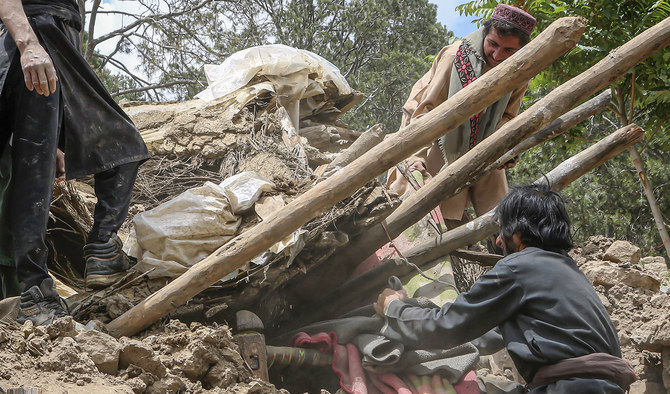GAYAN, Afghanistan: Survivors dug by hand Thursday through villages in eastern Afghanistan reduced to rubble by a powerful earthquake that killed at least 1,000 people, as the Taliban and the international community that fled their takeover struggled to aid the disaster's victims.
In Paktika province's hard-hit Gayan district, villagers stood atop the mud bricks that once was a home there. Others carefully walked through dirt alleyways, gripping onto damaged walls with exposed timber beams to make their way.

In this photo released by a state-run news agency Bakhtar, Afghans evacuate wounded in an earthquake in the province of Paktika, eastern Afghanistan, Wednesday, June 22, 2022. (Bakhtar News Agency via AP)
The quake was Afghanistan’s deadliest in two decades, and officials said the toll could rise. An estimated 1,500 others were reported injured, the state-run news agency said.
The disaster inflicted by the 6 magnitude quake heaps more misery on a country where millions face increasing hunger and poverty and the health system has been crumbling since the Taliban retook power nearly 10 months ago amid the U.S. and NATO withdrawal. The takeover led to a cutoff of vital international financing, and most of the world has shunned the Taliban government.
How — and whether the Taliban allow — the world to offer aid remains in question as rescuers without heavy equipment dug through rubble with their bare hands.
“We ask from the Islamic Emirate and the whole country to come forward and help us," said a survivor who gave his name as Hakimullah. "We are with nothing and have nothing, not even a tent to live in.”

An Afghan girl stands near a house that was damaged by an earthquake in the Spera District of the southwestern part of Khost Province, Afghanistan, Wednesday, June 22, 2022. (AP)
The full extent of the destruction among the villages tucked in the mountains was slow in coming to light. The roads, which are rutted and difficult to travel in the best of circumstances, may have been badly damaged, and landslides from recent rains made access even more difficult.
While modern buildings withstand magnitude 6 earthquakes elsewhere, Afghanistan's mud-and-brick homes and landslide-prone mountains make such temblors even more dangerous.
Rescuers rushed in by helicopter, but the relief effort could be hindered by the exodus of many international aid agencies from Afghanistan after the Taliban takeover last August. Moreover, most governments are wary of dealing directly with the Taliban.

An Afghan man sits near his house that was destroyed in an earthquake in the Spera District of the southwestern part of Khost Province, Afghanistan, Wednesday, June 22, 2022. (AP)
In a sign of the muddled workings between the Taliban and the rest of the world, the Taliban had not formally requested that the U.N. mobilize international search-and-rescue teams or obtain equipment from neighboring countries to supplement the few dozen ambulances and several helicopters sent in by Afghan authorities, said Ramiz Alakbarov, the U.N. deputy special representative to Afghanistan.
Still, officials from multiple U.N. agencies said the Taliban were giving them full access to the area.
Taliban spokesman Zabihullah Mujahid wrote on Twitter that eight trucks of food and other necessities from Pakistan arrived in Paktika. He also said Thursday that two planes of humanitarian aid from Iran and another from Qatar had arrived in the country.
Obtaining more direct international help may be more difficult: Many countries, including the U.S., funnel humanitarian aid to Afghanistan through the U.N. and other such organizations to avoid putting money in the Taliban’s hands.
The quake was centered in Paktika province, about 50 kilometers (31 miles) southwest of the city of Khost, according to neighboring Pakistan’s Meteorological Department. Experts put its depth at just 10 kilometers (6 miles). Shallow earthquakes tend to cause more damage.

Afghans look for survivors in the village of Gyan, in Paktika province, Afghanistan, Wednesday, June 22, 2022. (AP)
The death toll reported by the Bakhtar news agency was equal to that of a quake in 2002 in northern Afghanistan. Those are the deadliest since 1998, when an earthquake that was also 6.1 in magnitude and subsequent tremors in the remote northeast killed at least 4,500 people.
Wednesday’s quake took place in a region prone to landslides, with many older, weaker buildings.
In neighboring Khost province's Speray district, which also sustained serious damage, men stood atop what once was a mud home. The quake had ripped open its timber beams. People sat outside under a makeshift tent made of a blanket that blew in the breeze.
Survivors quickly prepared the district's dead, including children and an infant, for burial. Officials fear more dead will be found in the coming days.
“It is hard to gather all the exact information because it is mountainous area,” said Sultan Mahmood, Speray district's chief. "The information that we have is what we have gathered from the residents of these areas.”

















